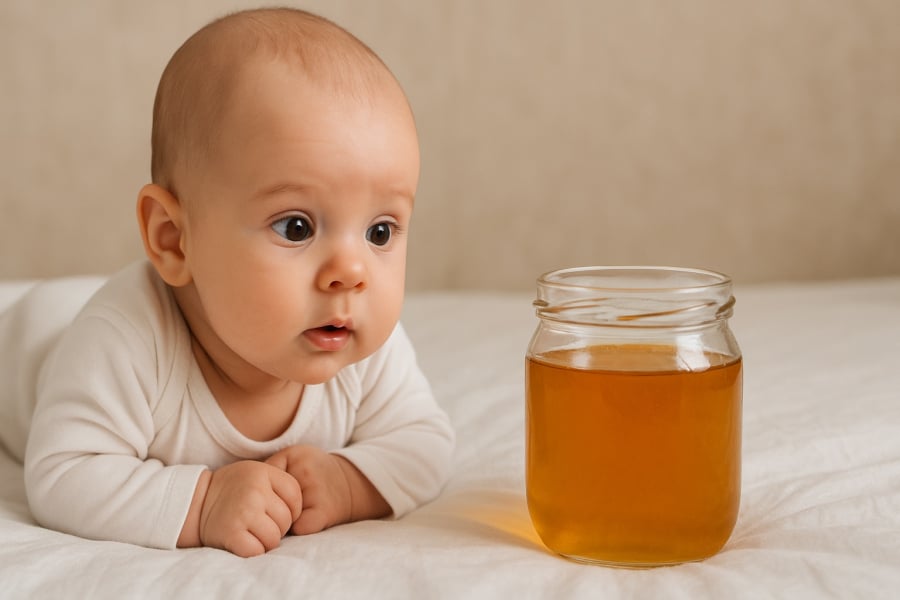The Hidden Dangers of Honey: What You Need to Know for Your Health’s Sake
Honey has become an increasingly popular natural sweetener in modern times, prized for its unique flavor and high nutritional value. However, it’s important to remember that honey isn’t safe for everyone. In particular, infants under one year of age, individuals with diabetes, those with a history of allergies, and people in sensitive health conditions need to approach honey consumption with caution.
According to Dr. Tran Thi Tra Phuong, a nutritionist at Tam Anh General Hospital in Hanoi, honey is packed with vitamins, minerals, and antioxidants that boost immunity, aid digestion, and improve skin health. However, honey can also become a health hazard if consumed inappropriately.
Infants Under One Year Old: Steer Clear of Honey, No Matter How Little
For newborns under the age of one, honey consumption can have dire consequences. The World Health Organization (WHO) and the US Centers for Disease Control and Prevention (CDC) advise against giving honey to children in this age group, even in small amounts. This is because honey is often stored in sealed containers for extended periods. If the honey extraction and bottling processes are unhygienic, spores of the bacterium Clostridium botulinum may be present.
Associate Professor Dr. Nguyen Van Luong, Deputy Director of the Central Pediatric Hospital, warns: “The digestive system of children under one year old is not yet fully developed, and they lack the ability to destroy these spores. Once inside the body, Clostridium botulinum will grow and release toxins, leading to symptoms such as respiratory failure, muscle paralysis, and even death.” Therefore, even a tiny amount of honey should be strictly avoided for infants under one year old.

Diabetics: Mind Your Blood Sugar Levels
Honey is well-known for its high sugar content, mainly fructose and glucose. According to the USDA National Nutrient Database, a single tablespoon of honey (about 21 grams) contains a whopping 17.3 grams of sugar and 64 kcal. This can severely impact individuals with diabetes if their blood sugar levels are not carefully monitored.
Dr. Nguyen Thi Thu Ha, an endocrinology specialist at Bach Mai Hospital, recommends: “Diabetics should consult their doctor before consuming honey. It is also crucial to closely monitor blood sugar levels after honey consumption to adjust their diet accordingly.”
Allergy Sufferers: Proceed with Caution
If you’ve ever experienced allergies to pollen, propolis (bee glue), or had a severe reaction to a bee sting, approach honey with caution. These could be indicators that your body doesn’t tolerate the components in honey well.
According to Dr. Le Thi Minh Huong, from the Allergy and Immunology Center at Bach Mai Hospital: “When honey is consumed, the immune system may mistake it for a harmful agent and release a large amount of histamine, triggering allergic reactions ranging from mild symptoms like itching and lip or facial swelling to life-threatening conditions such as difficulty breathing and anaphylaxis.”
Therefore, when trying honey for the first time, start with a small amount and monitor your body’s reaction over 24 hours. Discontinue use immediately if any abnormal signs occur.
Other Cases Where Honey Consumption Requires Caution
Not only diabetics and infants but also several other groups need to be cautious about honey consumption:
- Individuals with low blood pressure: Honey can dilate blood vessels, leading to lowered blood pressure. Hence, those with low blood pressure should refrain from consuming excessive honey.
- People with Irritable Bowel Syndrome (IBS): The high fructose content in honey can exacerbate digestive symptoms such as bloating and diarrhea.
- Individuals with liver disease: The liver has to work harder to process the sugar in honey, potentially leading to overload and worsening of fatty liver disease.
- Obese or weight-loss seekers: While honey is a healthier option than refined sugar, its high-calorie content can hinder weight loss efforts.
- Post-surgery patients: Honey may slow down the blood clotting process, so it’s essential to consult a doctor before consuming honey in such cases.
- Prescription medication users: Honey can interact with certain medications, altering their effectiveness.
Tips for Safe Honey Consumption
Dr. Tra Phuong emphasizes that even healthy individuals should consume honey in moderation. Adults should limit their calorie intake from added sugars and natural sweeteners (such as honey, syrup, and fruit juice) to no more than 10% of their total daily energy intake.
Additionally, opt for pure honey and avoid diluting it with boiling water, as high temperatures can destroy beneficial nutrients and enzymes. Moreover, refrain from combining honey with bean or seafood products, as this may lead to undesirable biochemical reactions.

Conclusion
Honey is indeed a treasure from nature, but it’s not always safe for everyone. Understanding the precautions and consuming it appropriately will help you maximize its benefits while steering clear of potential risks. Be a wise consumer and listen to your body to make informed decisions about your health!































